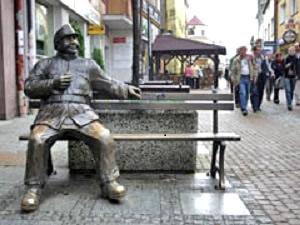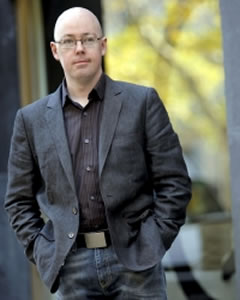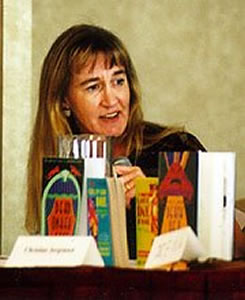De Nederlandse schrijver Jeroen Brouwers werd geboren op 30 april 1940 in Batavia, de hoofdstad van het voormalige Nederlands-Indië (tegenwoordig Djakarta, Indonesië). Zie ook alle tags voor Jeroen Brouwers op dit blog.
Uit: Datumloze dagen
“Ik was tien jaar en constant ongelukkig. In de galmende en wierookwalmende kapel, waar langdurige diensten werden gecelebreerd die knielend moesten worden doorstaan, bevond zich achter het altaar een overdonderend schilderwerk, vele strekkende meters hoog en breed en overbevolkt: het stelde het laatste oordeel voor. Een in het zenit hangende God was doende de rechtvaardigen te scheiden van de slechteriken, de schapen van de bokken, en te beslissen welke gezelschappen ten hemel mochten varen dan wel ter verdoemenis moesten worden weggetrapt, – zoals bij de aankomst van mensentransporten in Auschwitz, waar het stuk Ungeheuer met de doodskop op zijn pet en de bloedhond bij zijn laarzen hetzelfde deed: jij naar rechts, jij mag nog even verder leven, jij naar links, jij moet onmiddellijk dood. Het altaartafereel gaf een beangstigend gedrang van lichamen weer, in de loop van mijn kostschoolajren keek ik er dagelijks, niet zelden meerdere keren per dag naar op, – hoeveel lichamen, engelenvleugels, duivelshoeren, hoeveel bazuinen, bliksemslierten?
Ik heb me tijdens mijn aanwezigheden op deze plaats van gebed, gezang, gepreek en worgende verveling dikwijls voorgenomen alles op de muurschildering te tellen en te inventariseren, maar stelde het altijd uit tot een tijdstip dat het ongenoegen misschien nog gruwelijker zou zijn: eenmaal alle aantallen vastgesteld, dacht ik, restte er voor de toekomst niets meer om de tijd te doden dan me overal krabben en zo godgevaarlijk geeuwen dat de kaakgewrichten ervan kraakten. Steeds besloot ik dat dat tijdstip nog niet was aangebroken en stelde ik het vast op morgen, iedere dag opschorting naar morgen.”
Jeroen Brouwers (Batavia, 30 april 1940)
De Duitse schrijver en journalist Alexander Osang werd geboren op 30 april 1962 in Berlijn. Hij groeide op in de DDR en volgde een opleiding tot onderhoudsmonteur. Hij studeerde later journalistiek in Leipzig en werkte na zijn afstuderen voor het tv-programma Sport aktuell. Vanaf 1989 werkte hij voor de Berliner Zeitung. In 1999 ging hij als verslaggever voor de Spiegel naar New York. In 2000 verscheen zijn eerste roman Die Nachrichten.
Uit: Lennon ist tot
„Die Küche war leer, aber im Kühlschrank stand mein Essen, bedeckt mit einer durchsichtigen Frischhaltefolie. Huhn, Reis und Broccoli. Schon wieder Huhn. Es war kurz nach neun, von oben hörte ich die hohe Stimme von Teddy, der ins Bett musste, aber nicht wollte. Ich schaute in den großen weißen Kühlschrank, ich hätte mir gern eine Flasche Brooklyn Lager aus dem Bierkarton genommen, aber ich hatte Angst, dass sich David dann vielleicht auch eine nahm und zu mir in die Küche setzte, um über Haarausfall oder Deep Purple zu reden. Im Augenblick saß er neben seiner Frau auf der Eckcouch. Ich schloss den Kühlschrank und sah durch die Glastür, die Küche und Wohnzimmer trennte, zu den beiden hinüber. Auf ihren Gesichtern spiegelte sich das bläuliche Fernsehlicht irgendeines Schwarzweißfilms wie auf der polierten Schrankwand meiner Oma in Lichtenberg. Ihre Tochter Rose brachte Teddy ins Bett, sie hatten eigentlich nichts mehr zu tun in ihrem Leben, dachte ich. Ein ziemlich deprimierender Gedanke. Ich nahm mir ein Glas und füllte es mit Leitungswasser.
Die Millers hatten so eine komische Apparatur an ihrem Ha
hn, die das Wasser filterte. Das Wasser schmeckte wirklich ziemlich nach Chlor in New York, und die Apparatur änderte daran gar nichts, fand ich. Alle waren sehr vorsichtig hier in der Stadt, jeder Bauarbeiter trug einen Mundschutz, die Fleischverkäufer im Supermarkt hatten Gummihandschuhe an, und Kinder, die im Park Fahrrad fuhren, waren gepolstert wie Formel-1-Piloten. Ich schob das Essen in die Mikrowelle und stellte die Uhr auf drei Minuten. Nach zwei Minuten kam David, nahm sich ein Bier aus dem Kühlschrank und lehnte sich an die Kochinsel in der Mitte der Küche. Er trug ein schlabbriges T-Shirt der New York Mets aus der Saison ’86, das er sich in die Hose gestopft hatte.“
Alexander Osang (Berlijn, 30 april 1962)
De Duitse schrijfster Louise Rinser werd op 30 april 1911 in Pitzling geboren. Zie ook alle tags voor Louise Rinser op dit blog.
Uit: Mirjam
“Jehuda war es, der Ordnung schuf. Er schrie Befehle. Er hieß die Leute rechts und links des Weges sich aufstellen. So konnte Jeschua zwischen ihnen hindurch gehen, sie berühren, ein paar Worte mit ihnen reden. Jehuda hielt sie im Zaum, doch war er ungeduldig und im Zwiespalt mit sich selbst, das sah ich. Er stand auf seiten der Armen, doch war ihm Flickwerk, was Jeschua tat. Ein paar Heilungen, hundert Heilungen, tausend: was bedeutete das, wenn ganz Jisrael krank war und im Elend? Nicht Kranke heilen, nicht Almosen geben: die Wurzeln ausreißen!
Er murrte, er knurrte die Leute an, doch liebte er sie, denn sie waren ihm, was sie waren: die Ausgebeuteten, die Beraubten, die, denen das Erstgeburtsrecht abgelistet worden war von den Schlauen, den skrupellos Tüchtigen, den Geschäftemachern, den Römerfreunden, denen, die buckelten vor Priestern und Hofbeamten.
Es kamen freilich nicht nur Arme, denn, so stellte Jehuda befriedigt fest: auch die Reichen wurden krank, aber sobald sie kranke Reiche waren, stand Jehuda auf ihrer Seite, denn jetzt waren sie die Minderheit und diese Minderheit litt und mußte unterstützt werden. Aber er wollte nicht dulden, daß sie wie Arme behandelt wurden, nämlich kostenlos. Ich sah, daß man ihm Geld zusteckte. Jeschua bemerkte es lange nicht, doch als ers bemerkte, packte ihn Zorn. So zornig habe ich ihn seit der Tempelszene nicht gesehen, und auch später nie mehr.
Gib mir den Beutel, Jehuda!
Der hielt ihn fest mit beiden Händen. Jehuda, den Beutel!
Jehuda drückte ihn an seine Brust. Da riß ihn Jeschua ihm weg und leerte ihn aus, mitten unters Volk. Jehuda schrie vor Wut und dann vor Triumph: die Armen kämpften um das Geld wie Hunde um Knochen.
Jehuda stampfte und schrie: Gebt das Geld zurück, sofort!
Sie gaben es erschrocken zurück und begriffen nichts. Große Verwirrung.
Da siehst du, Rabbi, rief Jehuda, wohin Almosengeben führt! Flickwerk!”
Luise Rinser (30 april 1911 – 17 maart 2002)
De Duitse dichteres en schrijfster Ulla Hahn werd geboren op 30 april 1946 in Brachthausen. Zie ook alle tags voor Ulla Hahn op dit blog.
Ehe
Ehe
Paar
weise und frei
willig in diese Arche
getrieben von unserem Verlangen
nach Vollendung nach
endlosem Anfang
wie die Ringe an unseren Fingern
Und wir halten einander
die Hand
vor Augen einander
verbergend
vorn am Bug
den furchtbaren Steuermann.
Leises Licht
Ganz leise leise leise geht das Licht
den ich nicht kenne geht an meiner Seite
wir gehen wie ein Paar auf schöne Art
und scheu schau ich ihm manchmal ins Gesicht
Das neben meinem liegen wird wenn alles Licht
gegangen ist wird er an meiner Seite
mich Lieben wie ein Mann auf schöne Art
und treu und bleiben und es gibt ihn nicht.
Blinde Flecken
Daß wir so uneins sind hält uns zusammen
du dort ich hier – wir sind auf andrer Fahrt:
Dein Istgewesen mein Eswirdnochkommen
zwei blinde Flecken in der Gegenwart
die uns gehört wie Träume vorm Erwachen
wenn wir schon wissen daß wir Träumer sind
die mit uns spielt ein Weilchen in den Winden
bis jedes hier und dort sich wiederfindet.
Ulla Hahn (Brachthausen, 30 april 1946)
De Ierse schrijver John Boyne werd geboren in Dublin op 30 april 1971. Zie ook alle tags voor John Boyne op dit blog.
Uit: The Boy in the Striped Pyjamas
“Mother had walked into her own bedroom by then but Lars, the butler, was in there, packing her things too. She sighed and threw her hands in the air in frustration before marching back to the staircase, followed by Bruno, who wasn’t going to let the matter drop without an explanation.
‘Mother,’ he insisted. ‘What’s going on? Are we moving?’ ‘Come downstairs with me,’ said Mother, leading the way towards the large dining room where the Fury had been to dinner the week before. ‘We’ll talk down there.’ Bruno ran downstairs and even passed her out on the staircase so that he was waiting in the dining room when she arrived. He looked at her without saying anything for a moment and thought to himself that she couldn’t have applied her make-up correctly that morning because the rims of her eyes were more red than usual, like his own after he’d been causing chaos and got into trouble and ended up crying. ‘Now, you don’t have to worry, Bruno,’ said Mother, sitting down in the chair where the beautiful blonde woman who had come to dinner with the Fury had sat and waved at him when Father closed the doors. ‘In fact if anything it’s going to be a great adventure.’ ‘What is?’ he asked. ‘Am I being sent away?’ ‘No, not just you,’ she said, looking as if she might smile for a moment but thinking better of it. ‘We all are. Your father and I, Gretel and you. All four of us.’ Bruno thought about this and frowned. He wasn’t particularly bothered if Gretel was being sent away because she was a Hopeless Case and caused nothing but trouble for him. But it seemed a little unfair that they all had to go with her. ‘But where?’ he asked. ‘Where are we going exactly? Why can’t we stay here?’ ‘Your father’s job,’ explained Mother. ‘You know how important it is, don’t you?’”

John Boyne (Dublin, 30 april 1971)
De Europees-Amerikaanse schrijver David Zane Mairowitz werd geboren op 30 april 1943 in New York. Hij studeerde Engelse literatuurgeschiedenis en filosofie aan Hunter College, New York en theaterwetenschappen aan de University of California in Berkeley. In 1966 verhuisde hij naar Engeland, waar hij werkte als journalist en zelfstandig schrijver. Zijn hoorspelen werden op talrijke Europese radiostations uitgezonden.
Uit: Kafka
„No writer of our time, and probably none since Shakespeare, has been so widely over-interpreted and pigeon-holed. Jean-Paul Sartre claimed him for Existentialism, Camus saw him as an Absurdist, his lifelong friend and editor, Max Brod, convinced several generations of scholars that his parables were part of an elaborate quest for an unreachable God.
Because his novels The Trial and The Castle deal with the inaccessibility of higher authority, “Kafkaesque” has come to be associated with the faceless bureaucratic infrastructure which the highly efficient Austro- Hungarian Empire bequeathed the Western world. In any case, it is an adjective that takes on almost mythic proportions in our time, irrevocably tied to fantasies of doom and gloom, ignoring the intricate Jewish Joke that weaves itself through the bulk of Kafka’s work. Before ever becoming the Adjective, Franz Kafka (1883-1924) was a Jew from Prague, born into its inescapable tradition of storytellers and fantasists, ghetto-dwellers and eternal refugees. His Prague, “a little mother” with “claws,” was a place that suffocated him, but where he nonetheless chose to live all but the last eight months of his life.
Prague, at the time of Kafka’s birth in 1883, was still part of the Hapsburg Empire in Bohemia, where numerous nationalities, languages and political and social orientations intermingled and coexisted, for better or worse. For someone like Kafka, a Czech-born German-speaker, who was really neither Czech nor German, forming a clear cultural identity was no easy matter.“
David Zane Mairowitz (New York, 30 april 1943)
Boekomslag (Geen portret beschikbaar)
De Amerikaanse dichteres en schrijfster Annie Dillard werd geboren op 30 april 1945 in Pittsburgh. Zie ook alle tags voor Annie Dillard op dit blog.
Uit: For the Time Being
“The Talmud specifies a certain blessing a man says when he sees a person deformed from birth. All the Talmudic blessings begin “Blessed art Thou, O Lord, our God, King of the Universe, who . . .”. The blessing for this occasion, upon seeing a hunchback or a midget or anyone else deformed from birth, is “Blessed art Thou, O Lord, our God, King of the Universe, WHO CHANGES THE CREATURES.”
A chromosome crosses or a segment snaps, in the egg or the sperm, and all sorts of people result. You cannot turn a page in Smith’s Recognizable Patterns of Human Malformation [[ital]] without your heart pounding from simple terror. You cannot brace yourself. Will this peculiar baby live? What do you hope? The writer calls the paragraph describing each defect’s effects, treatment, and prognosis “Natural History.” Here is a little girl about two years old. She is wearing a dress with a polka-dot collar. The two sides of her face do not meet normally. Her eyes are far apart, and under each one is a nostril. She has no nose at all, only a no-man’s-land of featureless flesh and skin, an inch or two wide, that roughly bridges her face’s halves. You pray that this grotesque-looking child is mentally deficient as well. But she is not. “Normal intelligence,” the text says.
Of some vividly disfigured infants and children–of the girl who has long hair on her cheeks and almost no lower jaw, of the three-fingered boy whose lower eyelids look as if he is pulling them down to scare someone, of the girl who has a webbed neck and elbows, “rocker-bottom” feet, “sad, fixed features,” and no chin–the text says, “Intelligence normal. Cosmetic surgery recommended.”
Annie Dillard (Pittsburgh, 30 april 1945)
De Amerikaanse schrijfster Barbara Seranella werd geboren op 30 april 1956 in Santa Monica. Zie ook alle tags voor Barbara Seranella op dit blog.
Uit: No Man Standing
“Becker closed his eyes and took a deep breath through his mouth, giving his senses a break. He had seen death before, but this one made him check his gag reflex. Murder was one thing. People get mad, lose control, snap or whatever, and kill someone. It happened every day, every minute of the day somewhere, probably. But what kind of a human was capable of committing such extreme torture? That he would never fathom. Maybe he was old-fashioned, but the fact that the victim was a woman made this cruelty even worse. He flexed his own undamaged hands, unwillingly imagining the ache of having his fingers cracked like wishbones. “Let’s get to work,” he said. “
Barbara Seranella (30 april 1956 – 21 januari 2007)
De Tsjechische schrijver Jaroslav Hašek werd geboren op 30 april 1883 in Praag. Zie ook alle tags voor Jaroslav Hašek op dit blog.
Uit: Fateful Adventures of the Good Soldier Švejk (Vertaald door Cecil Parrott)
„And the State police Station Chief, looking at the pages of his report, flashed a smile of vindication and pulled out of his desk the secret circular from the State police Headquarters of the Land in Prague marked with the customary ‘Strictly Confidential’ and read through it one more time:
“All State police stations are under strict orders to monitor with immeasurably increased alertness all persons passing through the area. The redeployment of our troops in eastern Galicia has brought about that some Russian military detachments, having crossed the Carpathians, have assumed positions in the interior of our Empire, whereby the front has been shifted deeper toward the west of the Monarchy. This new situation has allowed Russian spies, given the mobility of the front, deeper penetration into the territory of our Monarchy, especially into Silesia and Moravia, from where, according to confidential reports, a large number of Russian intelligence operatives have set out for Bohemia. It has been determined that among them there are many Russian Czechs educated at the Russian military staff colleges who, having perfect mastery of the Czech language, seem to be especially dangerous spies since they can and certainly will conduct treasonous propaganda among the Czech populace. The Land Headquarters therefore orders the apprehension and detention of all suspects and above all increased vigilance in those areas where nearby there are garrisons, military centers and stations with military transport trains passing through. The detained are to be subjected to an immediate search and transported to the next higher authority.”

Jaroslav Hašek (30 april 1883 – 3 januari 1923)





















